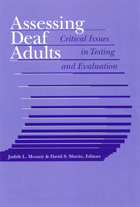
Section I frames the contexts facing deaf and hard of hearing individuals and those who test them, including a telling historical perspective. In Section II, chapters explore how deaf and hard of hearing candidates can meet the rigors of test-taking, how to level the playing field with a new approach to assessment, and what to consider to develop fully accessible licensing tests. The final chapter in this part examines the psychometric properties of intellectual assessments when used with deaf and hard of hearing people. Administrative Issues constitute Section III, beginning with legal considerations related to equity testing for deaf adults. An exploration of the potential of sign language interpretation in the testing environment follows.
Section IV provides case studies of deaf and hard of hearing adults from a variety of professions, including certification testing for therapeutic recreation, preparation strategies for university students, and ways to maximize access to licensure for social workers. A separate chapter addresses the impact of recent federal mandates on assessment of deaf and hard of hearing teachers and teaching candidates. The final section summarizes the current situation and presents recommendations to manage it, concluding with an epilogue on directions for the future.
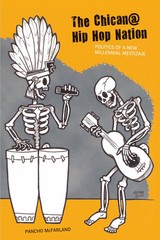

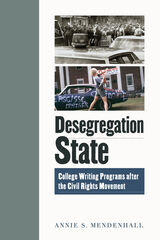
Formerly segregated state university systems crafted desegregation plans that gave them more control over policies for admissions, remediation, and retention. These plans created literacy requirements—admissions and graduation tests, remedial classes, and even writing centers and writing across the curriculum programs—that reshaped the landscape of college writing instruction and denied the demands of Black students, civil rights activists, and historically Black colleges and universities for major changes to university systems. This history details the profound influence of desegregation—and resistance to desegregation—on the ways that writing is taught and assessed in colleges today.
Desegregation State provides WPAs and writing teachers with a disciplinary history for understanding racism in writing assessment and writing programs. Mendenhall brings emerging scholarship on the racialization of institutions into the field, showing why writing studies must pay more attention to how writing programs have institutionalized racist literacy ideologies through arguments about student placement, individualized writing instruction, and writing assessment.
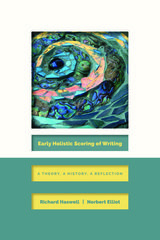
Early Holistic Scoring of Writing addresses the history of holistic essay assessment in the United Kingdom and the United States from the mid-1930s to the mid-1980s—and newly conceptualizes holistic scoring by philosophically and reflectively reinterpreting the genre’s origin, development, and significance.
The book chronicles holistic scoring from its initial origin in the United Kingdom to the beginning of its heyday in the United States. Chapters cover little-known history, from the holistic scoring of school certificate examination essays written by Blitz evacuee children in Devon during WWII to teacher adaptations of holistic scoring in California schools during the 1970s. Chapters detail the complications, challenges, and successes of holistic scoring from British high-stakes admissions examinations to foundational pedagogical research by Bay Area Writing Project scholars. The book concludes with lessons learned, providing a guide for continued efforts to assess student writing through evidence models.
Exploring the possibility of actionable history, Early Holistic Scoring of Writing reconceptualizes writing assessment. Here is a new history that retells the origins of our present body of knowledge in writing studies.

What can teachers in British and American inner-city schools learn from each other about literacy training? To explore this question, Sarah Warshauer Freedman and her British colleagues set up a writing exchange that matched classes from four middle and high schools in the San Francisco Bay area with their London equivalents.
Exchanging Writing, Exchanging Cultures offers concrete lessons to school reformers, policymakers, and classroom teachers about the value and effectiveness of different approaches to teaching writing. Freedman goes beyond the specific subject matter of this study, looking anew at Vygotsky's and Bakhtin's theories of social interaction and addressing the larger questions of the relationship between culture and education.
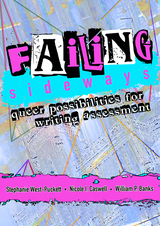
A failure-oriented assessment model unsettles some of the most common practices, like rubrics and portfolios, and challenges many deeply held assumptions about validity and reliability in order to ask what could happen if assessment was oriented toward possibility and potential. Working to engage a more capacious writing construct, the authors propose queer validity inquiry (QVI) as a model for assessment that values failure, affect, identity, and materiality. These overlapping lenses help teachers honor parts of writing and learning that writing studies faculty have struggled to hold onto in a world overly focused on quickness and efficiency in schools.
Through programmatic and classroom examples, Failing Sideways privileges what is valued in the classroom but traditionally ignored in assessments. Reimagining what matters in the teaching and learning of writing and using assessment data differently, this book demonstrates what writing can be and could do in a more diverse and just world.
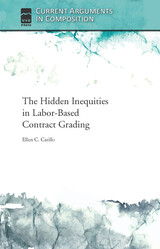
Current Arguments in Composition Series
The Hidden Inequities in Labor-Based Contract Grading intervenes in the increasingly popular practice of labor-based grading by expanding the scope of this assessment practice to include students who are disabled and multiply marginalized. Through the lens of disability studies, the book critiques the assumption that labor is a neutral measure by which to assess students and explores how labor-based grading contracts put certain groups of students at a disadvantage. Ellen C. Carillo offers engagement-based grading contracts as an alternative that would provide a more equitable assessment model for students of color, those with disabilities, and students who are multiply marginalized.
This short book explores the history of labor-based grading contracts, reviews the scholarship on this assessment tool, highlights the ways in which it normalizes labor as an unbiased tool, and demonstrates how to extend the conversation in new and generative ways both in research and in classrooms. Carillo encourages instructors to reflect on their assessment practices by demonstrating how even assessment methods that are designed through a social-justice lens may unintentionally privilege some students over others.



A new approach to training and evaluating world languages online instructors
The rapid growth in online world language programs in the United States coupled with the widespread implementation of virtual teaching in response to COVID-19 have pushed the field to reconceive instruction. Virtual learning creates unique challenges for instructors, who need to ensure that their students have adequate interaction with their peers, their professor, and native speakers of the language. Even with a growing demand for online language courses, there are few tools that evaluate the training and assessment of online language instructors.
In Online World Language Instruction Training and Assessment, authors Carmen King Ramírez, Barbara A. Lafford, and James E. Wermers fill that gap, providing a critical pedagogical approach to computer-assisted language learning (CALL) teacher education (CTE). By combining best CTE training and evaluation practices with assessment tools, the authors explain how teachers can integrate technology to build successful online programs. Their ecological, holistic approach addresses all facets of learning online—including pressing challenges of moving courses online, teacher training, developing core competencies and skills, instructions for assessment and self-evaluation, goal setting, and the normalization of critical CTE practices in an increasingly digital environment.
The authors propose new solutions to teacher training challenges, providing extensive rubrics and tools that can equitably assess online language instructor skills, the training they receive, the assessment process they undergo, and the instruments used for instructor assessment. A list of CALL and CTE resources (available on the Press’s website) further supports readers’ successful adaptation to an everchanging learning environment.
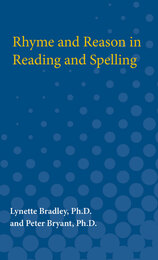
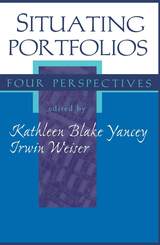
Yancey and Weiser bring together thirty-one writing teachers from diverse levels of instruction, institutional settings, and regions to create a stimulating volume on the current practice in portfolio writing assessment. Contributors reflect on the explosion in portfolio practice over the last decade, why it happened, what comes next; discuss portfolios in hypertext, the web, and other electronic spaces; and consider emerging trends and issues that are involving portfolios in teacher assessment, faculty development, and graduate student experience.
Contributors include Peter Elbow and Pat Belanoff, Gail Hawisher and Cynthia Selfe, Brian Huot, Sandra Murphy, and William Condon.

Using debate to develop advanced competency in a second language is a method that is finding increased interest among instructors and students alike, whether in synchronous online teaching or the individual classroom. Through debate, students learn how to make hypotheses, support their conclusions with evidence, and deploy the rhetoric of persuasion in the target language. Though this method provides an exciting pedagogy for moving students from the advanced to the superior level, there is a paucity of materials available for instructors who wish to plan a curriculum focused on debate. Teaching Advanced Language Skills through Global Debate: Theory and Practice provides teachers with both the theoretical underpinnings for using debate in the foreign language classroom as well as practical advice for developing reading, listening, writing, and speaking skills through debate. It discusses task-based language learning and helps instructors design debate-related tasks for the classroom.
Teaching Advanced Language Skills through Global Debate will be useful for any instructor working at the advanced level, and particularly for those training future language instructors. One of the new digital short publications available through Georgetown University Press, it is an ideal complement to the press’s new titles on mastering languages through global debate.
Georgetown Digital Shorts—longer than an article, shorter than a book—deliver timely works of peer-reviewed scholarship in a fast-paced, agile environment. They present new ideas and original texts that are easily and widely available to students, scholars, libraries, and general readers.
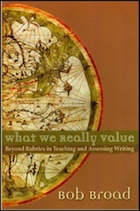
What We Really Value traces the origins of traditional rubrics within the theoretical and historical circumstances out of which they emerged, then holds rubrics up for critical scrutiny in the context of contemporary developments in the field. As an alternative to the generic character and decontextualized function of scoring guides, he offers dynamic criteria mapping, a form of qualitative inquiry by which writing programs (as well as individual instructors) can portray their rhetorical values with more ethical integrity and more pedagogical utility than rubrics allow.
To illustrate the complex and indispensable insights this method can provide, Broad details findings from his study of eighty-nine distinct and substantial criteria for evaluation at work in the introductory composition program at "City University." These chapters are filled with the voices of composition instructors debating and reflecting on the nature, interplay, and relative importance of the many criteria by which they judged students' texts. Broad concludes his book with specific strategies that can help writing instructors and programs to discover, negotiate, map, and express a more robust truth about what they value in their students' rhetorical performances.
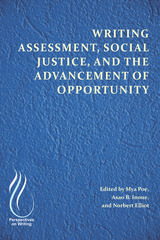
READERS
Browse our collection.
PUBLISHERS
See BiblioVault's publisher services.
STUDENT SERVICES
Files for college accessibility offices.
UChicago Accessibility Resources
home | accessibility | search | about | contact us
BiblioVault ® 2001 - 2024
The University of Chicago Press









